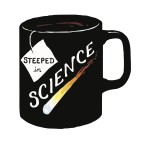Amazing! This guy writes about science and what scientists do for the lay reader without coming off as an arrogant arse. He makes the point th
at science is not a conglomeration of lifeless facts. Science, as an act, a career, a way of life, comes from questions, and questions come from ignorance. He’s trying to get his students and all of us to see the excitement in science, the discovery potential. He’s very anti-hypothesis, but the truth is, few working experiments actually start with a hypothesis — that’s for 7th grade science classes.
If you don’t start with a hypothesis, you do at least need to start with a well-formed question, and a good handle on what your variables are and a plan for isolating them. There are many times that we find an unexpected answer to our first question, only to immediately reveal another intriguing question — sometimes what we find is more ignorance. So we switch what variables we’re varying, alter the question, make lots of notes, and go through testing again. Individual experiments are often a bit meandering, and the author does a good job of portraying that without robbing it of meaning. In fact, it’s the freedom to meander and pursue a the truth even if it lies somewhere you weren’t initially looking that makes science exciting.
The case studies in the second half of the book were the strongest features of the book. Chapters 3 and 4 were a little weak, a little harder to read than the rest of the book. But the book makes sense without them, so if you’re short on time or patience, I’d recommend skipping those.



Leave a Comment
You must be logged in to post a comment.